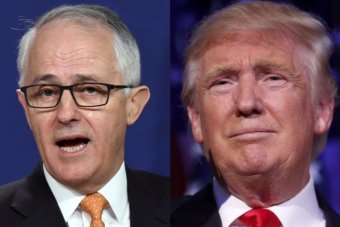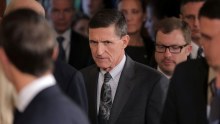Donald Trump and Brexit were missed by the polls, why didn't they miss Malcolm Turnbull?
Posted
Brexit. President-elect Donald Trump. Two seismic events in 2016 that opinion polls missed.
There's no doubt that polling worldwide is having a tough time right now.
Our own Prime Minister recently took a swipe at polling in an appearance on 7.30.
"I would have thought after this last election in the United States that people might focus less on the polls and less on the opinions of commentators on the ABC and other elite media outlets, and focus instead on what people are actually saying," he said.
But, that's the same PM who only a year ago used losing "30 Newspolls in a row" as justification for removing his predecessor from office.
So are Australian polls really that bad? Lets take a look.
What did the polls say at the last Australian election?
In the July federal election, the Coalition received 50.36 per cent of the two party preferred vote. The Labor Party won 49.64 per cent.
Here's what the major polls said just before the election:
- Newspoll - Coalition 50.5 per cent, ALP 49.5 per cent
- ReachTEL - Coalition 51 per cent, ALP 49 per cent
- Essential - Coalition 50.5 per cent, ALP 49.5 per cent
- Galaxy - Coalition 51 per cent, ALP 49 per cent
- Ipsos - Coalition 50 per cent, ALP 50 per cent
TL;DR: Major polls predicted a close Coalition victory. And that's pretty much what happened.
Are Australian pollsters some kind of wizards?
Nope. They've just got a some big advantages when it comes to their foreign counterparts.
Head of ReachTEL James Stewart says there are two reasons Australian pollsters generally get it right.
One is compulsory voting.
"When we get on to someone who is over the age of 18, the only question you have to ask them is are you registered to vote?," he said.
The second is the Telemarketing and Research Industry Standard.
"[The standard] essentially enables researchers to contact people even if they are on the Do Not Call register as long as the call is purely for research purposes," Mr Stewart said.
"The polling here is very mature. We've been doing it for a very long time and there are key players in the industry that have been doing it since the '60s and '70s and they've built a methodology that is true, tried and tested," he said.
CEO of the United States Studies Centre at the University of Sydney Simon Jackman agrees.
"Australian polling generally does do better than American political polling and the simple answer is compulsory turnout," he said.
"It's a much easier game in Australia."
OK. Why does compulsory voting make it easy?
Mr Stewart said compulsory voting meant there were a whole set of assumptions you didn't have make when conducting a poll.
"Not, do you intend to vote? How are you going to get there? ... and try and work with them to try and really understand how they are going to vote," he said
Mr Jackman said the census gives pollsters a great guide to the Australian electorate so samples are pretty much representative.
In countries with non-compulsory voting, the whole equation gets a lot more complicated.
"The lions' share of the work you do both in designing a survey and in particular on correcting it in the back end, is to do with this question of who will show up and vote," he said.
"And that is not known with any great certainty."
Basically, the more assumptions you have to make about voters, the less accurate your poll is.
Is Australian polling perfect?
It's not all sunshine and rainbows for Australian pollsters according to Mr Jackman.
He said Australian polls tended to overestimate the Greens vote (because of voter turnout issues with younger voters) and there was "little bit" of herding that occured (where polls get closer to each other in the home stretch).
Mr Jackman said marginal seat polling at the last election wasn't great.
"The national and the state level stuff was pretty good," he said.
"But if you look closely at some of the seat-by-seat polls that were being produced, it didn't really matter when they were being done, they were pretty horrible frankly," he said.
 Photo:
Polling in Australia isn't perfect. Unlike our dress code at polling booths, which unquestionably is. (Fairfax Media: Edwina Pickles)
Photo:
Polling in Australia isn't perfect. Unlike our dress code at polling booths, which unquestionably is. (Fairfax Media: Edwina Pickles)
So, should I pay attention to opinion polls in the future?
Here's Mr Jackman:
"I think Australians, in general, can be a little more confident in polling here than elsewhere," he said.
"Don't pay too much attention to any single poll, it's the trend that matters, understand that the quality of the polls degrades as you go down to very fast turnaround insta-polls that are run in marginal seats."
ReachTEL head Mr Stewart said the polling industry was booming as technology reduced the barrier of entry for everyone from politicians to large commercial companies and banks.
"You can turn around an entire national sample, 2,500 people in about an hour at night," he said.
"If something happens that day, you can capture the public sentiment and compare it how it was yesterday and then again how it's going to be tomorrow. And that's allowed a lot of power."
Topics: event, us-elections, government-and-politics, elections, federal-elections, australia








